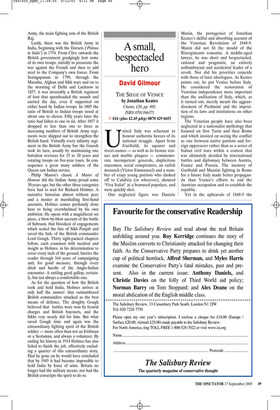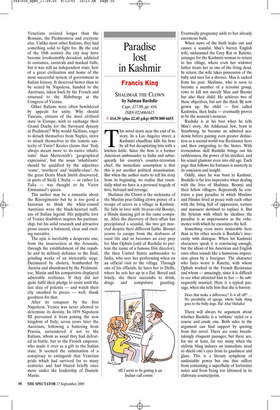A small, bespectacled hero
David Gilmour
THE SIEGE OF VENICE by Jonathan Keates Chatto, £20, pp. 495, ISBN 0701166371 ✆ £16 (plus £2.45 p&p) 0870 429 6655 United Italy was reluctant to honour authentic heroes of its national struggle. Apart from Garibaldi, its squares and street-names — as well as its bronze statues and marble plaques — commemorate incompetent generals, duplicitous statesmen, serial conspirators, an oafish monarch (Victor Emmanuel) and a number of crazy young patriots who dashed off to Calabria (or wherever), shouted ‘Viva Italia!’ at a bemused populace, and were quickly shot.
One neglected figure was Daniele Manin, the protagonist of Jonathan Keates’s skilful and absorbing account of the Venetian Revolution of 1848-9. Manin did not fit the mould of the Risorgimento romantic. A middle-aged lawyer, he was short and bespectacled, rational and pragmatic, an entirely unflamboyant and accidental leader of a revolt. Nor did his priorities coincide with those of later ideologues. As Keates points out, he put Venice before Italy. He considered the restoration of Venetian independence more important than the unification of Italy, which, as it turned out, merely meant the aggrandisement of Piedmont and the imposition of its laws and institutions on other regions.
The Venetian people have also been neglected in a nationalist mythology that focused on first Turin and then Rome and which insisted on seeing the conflict as one between native patriots and foreign oppressors rather than as a series of Italian civil wars within a contest that was ultimately decided by international battles and diplomacy between Austria, France and Prussia. The memory of Garibaldi and Mazzini fighting in Rome for a future Italy made better propaganda than Venice’s efforts to end the Austrian occupation and re-establish the republic.
Yet in the upheavals of 1848-9 the Venetians resisted longer than the Romans, the Piedmontese and everyone else. Unlike most other Italians, they had something solid to fight for. By the end of the 18th century the city may have become irredeemably decadent, addicted to costumes, carnivals and masked balls, but it was still an independent state, heir of a great civilisation and home of the most successful system of government in Italian history. It deserved better than to be seized by Napoleon, handed to the Austrians, taken back by the French and returned to the Habsburgs at the Congress of Vienna.
Other Italians were often bewildered by appeals for unity. Why should Tuscans, citizens of the most civilised state in Europe, wish to exchange their Grand Duchy for the Savoyard dynasty in Piedmont? Why would Sicilians, eager to detach themselves from Naples, strive to attach themselves to the remote austerity of Turin? Keates claims that ‘Italy always meant more to its native inhabitants’ than Metternich’s ‘geographical expression’, but the noun ‘inhabitants’ should be qualified by the adjectives ‘some’, ‘northern’ and ‘middle-class’. As the great Denis Mack Smith discovered, in parts of Sicily L’Italia — or rather La Talia — was thought to be Victor Emmanuel’s queen.
The author may be a romantic about the Risorgimento but he is too good a historian to think the white-coated Austrians were the black-hearted ruffians of Italian legend. His palpable love of Venice doubtless inspires his partisanship, but his solid research and attractive prose ensure a balanced, clear and exciting narrative.
The epic is inevitably a desperate one, from the insurrection at the Arsenale, through the establishment of the republic and its military defiance to the final, grinding weeks of an inexorable siege. Decimated by cholera, bombarded by Austria and abandoned by the Piedmontese, Manin and his compatriots displayed admirable resilience. If they did not quite fulfil their pledge to resist until the last slice of polenta — and watch their city smashed to pieces — well, thank goodness for that.
After its conquest by the first Napoleon, Venice was never allowed to determine its destiny. In 1859 Napoleon III prevented it from joining the new kingdom of Italy; seven years later the Austrians, following a battering from Prussia, surrendered it not to the Italians, whom as usual they had defeated in battle, but to the French emperor, who made it over as a gift to the Italian state. It seemed the culmination of a conspiracy to extinguish that Venetian pride which had survived for so many centuries and had blazed briefly once more under the leadership of Daniele Manin.




















































 Previous page
Previous page